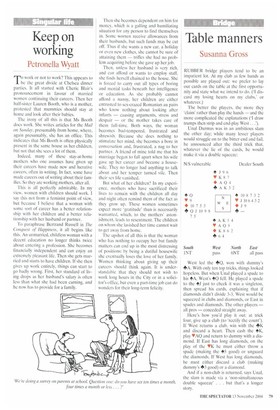Keep on working
Petronella Wyatt
rr o work or not to work? This appears to I be the great divide at Chelsea dinner parties. It all started with Cherie Blair's pronouncement in favour of married women continuing their careers. Then her half-sister Lauren Booth, who is a mother, protested that mummies should stay at home and look after their babies.
The irony of all this is that Ms Booth does work. She writes articles for the Mail on Sunday, presumably from home, where, again presumably, she has an office. This indicates that Ms Booth is often physically present in the same house as her children, but not that she sees a lot of them.
Indeed, many of these stay-at-home mothers who one assumes have given up their careers have made new and lucrative careers, often in writing. In fact, some have made careers out of writing about their families. So they are working mothers, after all.
This is all perfectly admirable. In my view, women with children should work. I say this not from a feminist point of view, but because I believe that a woman with some sort of career has a better relationship with her children and a better relationship with her husband or partner.
To paraphrase Bertrand Russell in The Conquest of Happiness, it all begins like this. An unmarried, childless woman with a decent education no longer thinks twice about entering a profession. She becomes financially independent and can enjoy an extremely pleasant life. Then she gets married and starts to have children. If she then gives up work entirely, things can start to go badly wrong. First, her standard of living drops as her husband's salary is often less than what she had been earning, and he now has to provide for a family. Then she becomes dependent on him for money, which is a galling and humiliating situation for any person to find themselves in. Some women receive allowances from their husbands, but such funds may be cut off. Thus if she wants a new car, a holiday or even new clothes, she cannot be sure of attaining them — trifles she had no problem acquiring before she gave up her job.
Then,unless her husband is very rich, and can afford or wants to employ staff, she finds herself chained to the house. She is forced to carry out all types of boring and menial tasks beneath her intelligence or education. As she probably cannot afford a nanny, her children are either entrusted to sex-crazed Romanian au pairs who know nothing about looking after infants — causing arguments, stress and despair — or the mother takes care of them full-time. Both ways, the woman becomes bad-tempered, frustrated and shrewish. Because she does nothing to stimulate her mind, she becomes a bore in conversation and, frustrated, a nag to her partner. A friend of mine told me that his marriage began to fall apart when his wife gave up her career and became a housewife. They no longer had anything to talk about and her temper turned vile. Then their sex life vanished.
But what of her children? In my experience, mothers who have sacrificed their lives to remain with the children all day and night often remind them of the fact as they grow up. These women sometimes expect more 'gratitude' than is necessarily warranted, which, to the mothers' astonishment, leads to resentment. The children on whom she lavished her time cannot wait to get away from home.
The upshot of all this is that the woman who has nothing to occupy her but family matters can end up in the most distressing of positions: by being a dutiful housewife she eventually loses the love of her family. Women thinking about giving up their careers should think again. It is understandable that they should not wish to work long hours in the City or in a solicitor's office, but even a part-time job can do wonders for their long-term felicity.


























































































 Previous page
Previous page